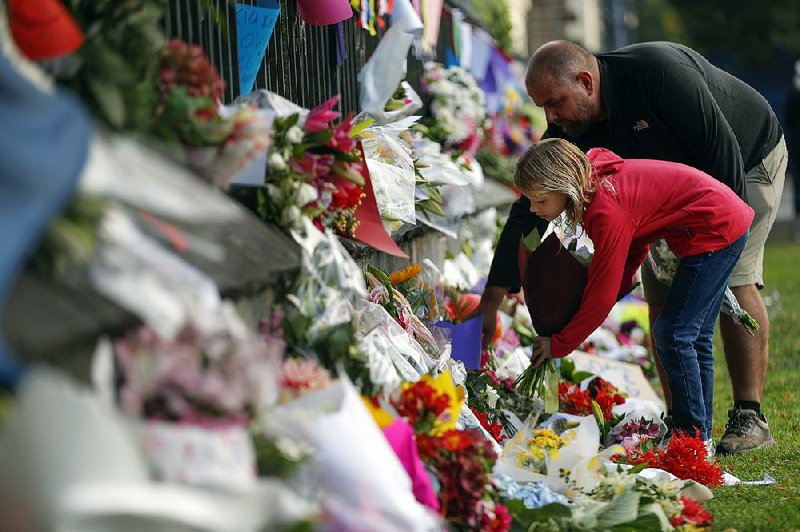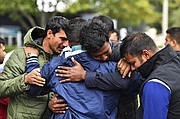CHRISTCHURCH, New Zealand -- The death toll in the shootings at two New Zealand mosques rose to 50 today after police found another victim while removing bodies from the crime scenes.
Police Commissioner Mike Bush also said 36 people are still hospitalized and that two of them are in critical condition.
New Zealand's stricken residents have been reaching out to Muslims in their neighborhoods and around the country, with a determination to show kindness to a community in pain.
Some families still waited to learn the fate of those who were unaccounted for after the Christchurch shootings. Others clamored for medical examiners to release loved ones' remains in time to meet Islamic rules for quick burial. Police were still processing the pair of crosstown crime scenes as investigators began sifting the background of the primary suspect.
The suspect, Brenton Harrison Tarrant, 28, appeared in court Saturday under strict security, shackled and wearing all-white prison garb, and showed no emotion when the judge read his one murder charge.
The judge said "it was reasonable to assume" that more such charges would follow.
The massacre during Friday prayers prompted a heartfelt response from Prime Minister Jacinda Ardern, who pronounced it "one of New Zealand's darkest days" and said the shooter had chosen to strike in New Zealand "because we represent diversity, kindness, compassion."
Her fellow countrymen seemed to want to prove her right by volunteering acts of kindness. Some offered rides to the grocery store or volunteered to walk with their Muslim neighbors if they felt unsafe.
In online forums, people discussed Muslim food restrictions as they prepared to drop off meals for those affected.
"Love always wins over hate. Lots of love for our Muslim brothers," read a handwritten card on a wall of flowers in a historic part of the city that stretched a full block.
Still, Muslims were advised to stay away from mosques while the nation's security alert remained at the second-highest level after the deadliest shooting in modern New Zealand history.
Outside one of the two mosques, 32-year-old Ash Mohammed pushed through police barricades in hopes of finding out what happened to his father and two brothers, whose cellphones rang unanswered. An officer stopped him.
"We just want to know if they are dead or alive," Mohammed told the officer.
Searching for any news, families and friends of the victims gathered at the city's Hagley College, near the hospital.
They included Asif Shaikh, 44, who said he was among more than 100 people at the Al Noor mosque when the attacker walked in. He said he survived by playing dead, adding he was desperate to know what happened to his friends who were there with him.
"It's been 36 hours; I haven't heard anything about them," he said.
Nearby, Akhtar Khokhur leaned on the shoulders of her friend and cried as she held up her cellphone with an image of her husband.
"I still don't know where he is," she said.
Khokhur, 58, and husband Mehaboobbhai Khokhur, 65, had traveled from India to spend time with their son Imran, their first visit in the eight years since he moved to New Zealand. The couple was due to fly out today.
Imran had dropped off his father, an electrical engineer, at the Al Noor mosque on Friday and was looking for a parking space when the shooting began. They have not heard from Mehaboobbhai since.
Outside the Christchurch courtroom on Saturday, Omar and Yama Nabi spoke about their lost 71-year-old father, Hajji Daoud Nabi, a refugee of the Soviet-Afghan War who arrived in New Zealand decades ago.
Survivors told Omar Nabi that his father had leaped on top of another worshipper as a human shield when the attack unfolded at Al Noor mosque. Nabi had gone to the court to get a glimpse of the man who killed his father, he said, but the public was not allowed inside.
"I need to sit there and watch what's going on," Nabi said. "One part of me wants to kill him, but this is not what I want to portray Muslims as."
Yasir Amin Nasir, 35, who moved from Lahore, Pakistan, five years ago, now works for the Christchurch City Council. He and his father, Muhammad Amin Nasir, had parked their car up the road from Al Noor Mosque on Friday and were walking toward the building when they first heard gunfire.
"Two, three seconds, he was just in front of us, pointing the gun at us," Yasir Amin Nasir said.
"I saw him. He looked at us," Nasir said. "He was driving. He stopped the car when he spotted us, and he got his gun."
Nasir said the gunman aimed the weapon across the driver's side of the car, through the passenger window toward him and his father, and began firing.
His father was hit twice. On Saturday night, he was in critical condition in Christchurch Hospital.
His father, a regular traveler to New Zealand, had arrived three weeks ago for his latest visit and had planned to stay for longer than usual.
"He likes it here," Nasir said. "He said he would stay for at least one year because of peace, because here he has nothing to worry about, he can just relax."
THE SUSPECT
Ardern, who flew to Christchurch to visit with families Saturday, said there appeared to be "one primary perpetrator, but we want to make sure that we don't take anything for granted in ensuring New Zealanders' safety."
During the Saturday morning hearing, a man who was not in court was charged with using writings to incite hatred against a race or ethnicity, but it was not clear whether his case was related to the mosque attacks.
Bush said Tarrant was involved in the shootings at both the Al Noor mosque and the Linwood mosque but stopped short of saying he was the sole gunman.
Authorities said two other armed suspects were taken into custody Friday while police tried to determine what role, if any, they played in the attack.
Authorities later said they do not believe the other three people who had been arrested were involved in the shootings.
Tarrant, an Australian native, had a registered address in southern New Zealand but lived in the country sporadically. The former fitness trainer led an itinerant lifestyle and traveled extensively to Bulgaria, North Korea and countries with large Muslim populations, including Turkey and Pakistan, officials said.
Tarrant's relatives in the Australian town of Grafton, in New South Wales, contacted police after learning of the shooting and were helping with the investigation, local authorities said. Tarrant has spent little time in Australia in the past four years and only had minor traffic infractions on his record.
In a 74-page manifesto posted on social media attributed to Tarrant, he identified himself as an Australian and white supremacist who was out to avenge attacks in Europe perpetrated by Muslims.
He also expressed his admiration for Dylann Roof and Anders Breivik, two far-right mass killers, and scrawled neo-Nazi symbols and slogans on his weapons, according to the manifesto.
The New Zealand Herald reported Saturday that minutes before the attack began, Tarrant sent a copy of the manifesto explaining his actions to Ardern's office and media outlets.
The gunman livestreamed 17 minutes of the rampage at the Al Noor mosque, where, armed with at least two assault rifles and a shotgun, he killed at least 41 people. More people were killed a short time later in the attack at the Linwood mosque about 3 miles away.
Facebook, Twitter and Google scrambled to take down the gunman's video, which was widely available on social media for hours after the shooting.
The video showed the killer was carrying a shotgun and two fully automatic military assault rifles, with an extra magazine taped to one of the weapons so he could reload quickly.
Ardern said Tarrant was a licensed gun owner who bought the five guns used in the crimes legally.
Tarrant obtained a license in November 2017 for the guns that would be used in the shooting; he began purchasing the weapons that December, according to officials.
After a pledge by Ardern to update the country's gun-control laws, New Zealand Attorney General David Parker said at a vigil that semi-automatic weapons would be banned. Officials later demurred, saying more debate and analysis would be needed before new laws were adopted.
Ardern also promised a look at why Tarrant had escaped official notice. Security officials are now investigating whether they had overlooked warning signs, she said.
Information for this article was contributed by Nick Perry, Juliet Williams, Kristen Gelineau and Rod McGuirk of The Associated Press; by Damien Cave and Jamie Tarabay of The New York Times; and by Emanuel Stoakes, Steve Hendrix, Rebecca Macfie, Siobhan O'Grady, Isaac Stanley-Becker, Eli Rosenberg and Alex Horton of The Washington Post.
A Section on 03/17/2019

